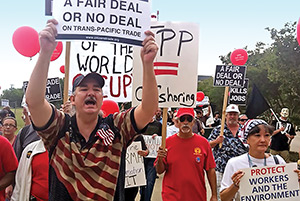Search News
For the Media
For media inquiries, call CWA Communications at 202-434-1168 or email comms@cwa-union.org. To read about CWA Members, Leadership or Industries, visit our About page.
Also in Fall 2014
- Fair Trade For The 21st Century
- Here's How We're Fighting Back
- Justice at CNN after 11 Years
- Passenger Service Agents at American, US Airways
- TPP: Means More U.S. Jobs Will Be Sent Overseas
- TPP: Threatens Our Health, Consumer Safety and the Environment
- What's the SCARIEST Part of the TPP TRADE DEAL?
- Elections Are About Choices!
- Republican Senators Have a Plan to Cripple the NLRB
TPP Allows Foreign Corporations to Challenge Our Laws
 Over the past several years and in nearly every trade deal since NAFTA, corporations are given more power than actual governments. The “investor-state dispute settlement” in TPP says that the “expected future profits” of corporations take priority over the concerns of a country and its citizens. These provisions don’t have anything to do with trade, but they give extraordinary new powers to corporations.
Over the past several years and in nearly every trade deal since NAFTA, corporations are given more power than actual governments. The “investor-state dispute settlement” in TPP says that the “expected future profits” of corporations take priority over the concerns of a country and its citizens. These provisions don’t have anything to do with trade, but they give extraordinary new powers to corporations.
TPP is the latest in a string of trade deals that would allow corporations to challenge the laws and regulations that our elected representatives have enacted. How? Foreign investors simply have to show that future profits may be affected by a country’s environmental standards, or public health laws or even a “Buy American” program. Then, the corporations can bypass a country’s courts and directly sue national governments in international UN or World Bank tribunals. Three private attorneys sit on the tribunal and get to determine whether the country must compensate a corporation for losses in profits. These attorneys are not accountable to the citizens of any country. There is no outside appeal. This process makes a mockery of our democracy.
Foreign Corporations Want to Re-Write U.S. Laws
 |
| If you agree that three lawyers overseas should decide whether foreign corporations can overrule U.S. laws, then TPP is for you. |
The U.S. could learn a thing or two from Germany. In that country, there is widespread opposition to Investor-State Dispute Settlement, the provision the U.S. and other countries are pushing for in the proposed Trans-Pacific Partnership and a proposed deal with European nations.
As negotiations move forward on the Transatlantic Trade and Investment Partnership (TTIP), an agreement between the European Union countries and the U.S. that is similar to TPP, a wide range of German elected and civic leaders have expressed disbelief that the U.S. remains serious about including ISDS. From the German perspective, that’s a failed approach that shouldn’t be a part of a trade deal.
Germany isn’t alone. Chile has concerns about the provisions that give multinational corporations super powers at the expense of governments and their citizens. French and Canadian lawmakers are worried about the impact of ISDS on their laws too.
This attempt by investors and corporations to hijack our laws must be defeated.
Unbelievable, but True
Sounds incredible, doesn’t it? But trade agreements like NAFTA and now TPP give foreign corporations veto power over the decisions made by our government and our elected representatives. Here are just a few examples of corporations challenging national laws using trade agreements. More than $430 million in compensation has already been paid out to corporations in cases brought by provisions in trade deals. Another $38 billion is pending in 19 more claims, all related to public health, the environment and other non-trade issues.
Australia
Philip Morris is contesting an Australian law requiring that all cigarettes to be sold in plain packaging, a move the government enacted to stamp out the tobacco industry’s last marketing tool to recruit new smokers. The company wants compensation of billions of Australian dollars to compensate for lost profits in Australia. Never mind that smoking triggers social and health costs of around $32 billion each year.
Egypt
French multinational Veolia, which owns SuperShuttle, recently sued the government of Egypt for at least 82 million Euros, challenging Egypt’s decision to raise the monthly minimum wage and make other labor reforms. If Veolia wins, countries will think twice before boosting workers’ pay or making any other changes that could affect a corporation’s “expected profits.”
Peru
U.S. Corporation the Renco Group, a privately owned company, is demanding $800 million from the Peruvian government after Peru moved to regulate toxic waste and close a dangerously polluting smelter. Renco ignored two extensions granted by Peru to clean up its act; when Peru denied the company a third extension, it went to a trade tribunal. Local residents and especially children have suffered serious health consequences.
Germany
Germany passed a law eliminating nuclear power plants by 2022 in the wake of the nuclear disaster at Fukushima, Japan. Now Swedish energy company Vattenfall is suing the German government for 3.7 billion Euros, claiming that this phase-out would hurt its “expected profits.”
Mexico
Metalclad, a U.S. corporation, challenged the decision by a Mexican municipality not to grant a construction permit for a toxic waste facility unless the firm cleaned up existing toxic waste. Local citizens feared the new facility would further pollute their water supply, yet a secret tribunal ruled in favor of Metalclad and awarded it $16.2 million.